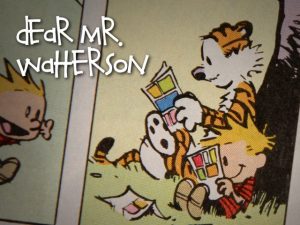
 In “Dear Mr. Watterson”, director Joel Allen Schroeder’s exploration into the world of "Calvin and Hobbes" fandom, Schroeder is not just our tour guide -- he’s also a fan himself. He starts the movie by explaining his own introduction to the comic and its impact on his life, and he shows up on camera intermittently throughout. While a sequence of interviews with celebrities, anonymous fans, people who worked with Watterson, and comic writers who were influenced by his work make up the majority of the film, Schroeder supplements them with his own journey to the artist's hometown and a visit to an Ohio State library, which holds on to much of the original "Calvin and Hobbes" art.
In “Dear Mr. Watterson”, director Joel Allen Schroeder’s exploration into the world of "Calvin and Hobbes" fandom, Schroeder is not just our tour guide -- he’s also a fan himself. He starts the movie by explaining his own introduction to the comic and its impact on his life, and he shows up on camera intermittently throughout. While a sequence of interviews with celebrities, anonymous fans, people who worked with Watterson, and comic writers who were influenced by his work make up the majority of the film, Schroeder supplements them with his own journey to the artist's hometown and a visit to an Ohio State library, which holds on to much of the original "Calvin and Hobbes" art.
The most illuminating parts of the movie are the series of interviews with Watterson’s fellow comic strip creators, including such revered figures as Bill Amend ("Foxtrot"), Stephan Pastis ("Pearls Before Swine"), and Berkeley Breathed ("Bloom County"). They talk about the influence of "Calvin and Hobbes" on their work and place the strip in historical context, describing the formative comics, like Walt Kelly’s "Pogo", that influenced Watterson.
Towards the end, the film spends some time showing talking heads bemoaning both the shrinking of comic sections in newspapers and the way that internet and cable television have taken away the singular national culture in which you could count on everybody to know a few common cultural precepts. The film also spends some time with people debating Watterson’s refusal to license his characters. The discussion on both of these issues feels insufficient, out of place, and overly weighty for a film that’s a salute to a legendary comic strip rather than a serious think piece.
Ultimately though, the fact that the movie isn’t the right forum for a thorough discussion of complex issues is beside the point. The film persuasively makes the argument that one of the reasons Calvin and Hobbes was so successful and beloved is that it means so many different things to so many different people. People from various backgrounds, Schroeder tells and shows us, have come back to these characters again and again at various points in their lives, and found different aspects and angles every time: humor, pop philosophy, encouragement, subversive but not overbearing political commentary, and occasional melancholy. At its heart, though, "Calvin and Hobbes" was a joyous comic, and it’s hard for some of that joy not to rub off on the viewer while hearing other people talk about how much they love the strip.